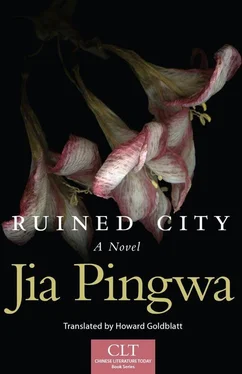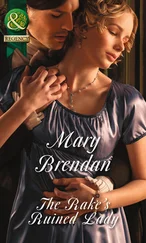“Why are you doing that?” she asked.
“You think I’m being shameless, don’t you?” Niu Yueqing said. “A woman can run as far and fast as she wants, but sooner or later she’ll run into men.”
“You’ll just spoil him even more. He won’t drink that.”
But he drank it down. “I did that because of the fantastic thing you just said.”
“What did I say?” Niu Yueqing asked, immediately deflating him.
“I know,” Liu Yue said. “It was about a woman running into a man. Zhuang Laoshi loves things like that and thinks they’re good enough to be written down. If you curse him with these phrases in the future, he won’t be mad.”
. . .
Aunty Liu, who delivered milk, had come to the compound more than once without seeing Zhuang, so she asked around and learned that he had hurt his foot and was staying at Shuangren fu. The next time she came to the city, she made a point of walking the extra distance to deliver his milk and brought along a large pumpkin. Applying the meat to an injury, she said, was an effective cure for a sprain. Grateful for her kindness, Niu Yueqing tried to pay for the pumpkin, but Aunty Liu wouldn’t hear of it. Then, when the tofu vendor walked by, Niu Yueqing wanted to buy some for the woman.
“I don’t eat city tofu,” she said. “It upsets my stomach.”
“Allergic?” Zhuang asked.
“No. City tofu has gypsum and doesn’t taste as good as tofu from the countryside. I’ve heard that city tofu makers add old gypsum that the bone and joint ward tosses over their wall.”
Zhuang laughed. “I guess I should save the plaster on my foot, then.”
“I know you’re saying this as a way to turn down my gift,” Niu Yueqing said. “So how can we thank you?”
“Ai-ya! There’s no need to thank me. It’s my good fortune to get to know you. When I came into the city a few days ago, the area near East Avenue was closed and sirens were going off. I was told that a Beijing official was in town, so no one was allowed to cross the street until the official’s car had passed. I walked on with my cow anyway, and a pockmarked policeman railed at me, ‘You can’t cross, not you and not your cow.’ So I said, ‘Comrade, I’m delivering fresh milk to Zhuang Zhidie.’ ‘Zhuang Zhidie?’ he said. ‘Is that the writer?’ I said, ‘Of course it is.’ He snapped off a salute and said, ‘Go ahead. Please tell Mr. Zhuang that a policeman named Su is a fan of his.’ So I crossed the street with my cow, having gained an enormous amount of face. You know, eight hundred, even a thousand yuan is no match for that kind of honor.”
“Is that the truth?” Liu Yue asked.
“I wouldn’t lie to you.”
Liu Yue smiled at Zhuang. “Oh, I remember something else,” she said, arching her brows. “Hong Jiang called the day after you went to the hospital and said you’ve been invited to serve as an advisor to four community factories. You won’t have to do anything except write about their products and submit work reports. They’ll pay you a thousand a month.”
“Hong Jiang loves meeting strangers. He can make friends at a urinal. I wonder how he’s used my name this time. What would I be doing for them?”
“That’s what I asked. He said that intellectuals are in great demand; in the old days, bandits all needed advisors, and now community factories are following suit in order to make more money.” She slapped Zhuang on the back, knocking a gadfly to the floor. “So many people around, and yet they picked you.”
“That gadfly must not have been a lover of literature or the head of a factory,” Zhuang said, making everyone laugh.
They continued to talk until it had gotten late, and Zhuang strained to get down to drink milk from under the cow. Intrigued, Liu Yue said she wanted to try, too, but the cow stamped a hoof the moment she was on the ground and brushed her face with her tail. That hurt, and when Liu Yue tried to get out of the way, her jade bracelet hit the floor and broke. Her face fell. She said it had cost her a month’s salary at her previous job. She picked up a broken brick to hit the cow, but Zhuang stopped her.
“I could tell it was inferior jade and not worth much. Your dajie has a jade bracelet that’s too small for her thick arm. I’ll get her to give it to you.”
That brought a smile to the girl’s face. “This ill-mannered cow doesn’t move when you drink her drink. Maybe you were connected in a previous life.”
“Could be,” Zhuang said. “You broke a bracelet because of the cow, so maybe you owed her a small debt in your previous life.”
Though it was only a casual comment, it appeared to bother Liu Yue, who was glum the rest of the day, distracted by the possibility that she and the cow could have been karmic enemies. After dinner, she went to the city wall, where she gathered a large basket of wormwood, purslane, and splendens grass to feed the cow the next morning.
“You’re a good person, Liu Yue,” Niu Yueqing said. “We’re destined to be sisters. I can’t bear to see anyone suffer, either. Whenever there’s a funeral, I tear up when I hear the family members cry. If a beggar comes and I don’t have anything ready to eat, I’ll go buy some steamed buns for him. Early last summer, three migrant wheat reapers came down from Mount Zhongnan, but couldn’t find work. One rainy day they curled up under an eave at the entrance to the lane, so I had them spend the night here. Zhuang Laoshi laughs at me, says I was born to be poor.”
“Impossible,” Liu Yue said. “You’re more fortunate than most people. Even Aunty Liu, the milk woman, told me that the mistress has the look of a goddess, with your broad face, straight nose, and bright eyes.”
“He meant that I won’t enjoy great fortune.”
“That’s probably true. Before I came here, I imagined the kind of rare delicacies you ate at home, but after I arrived, I was surprised to find that you like simple dishes. You don’t chop and stir-fry your vegetables; instead you boil them. Even us country folk don’t eat them that way.”
“It’s the most nutritious way to cook vegetables. Everyone knows that Zhuang Laoshi prefers corn gruel and boiled potatoes, but no one is aware that I add Korean ginseng powder to his food every day.”
“You don’t lack for money, so why don’t you wear fashionable clothes? And you use far fewer cosmetic products than my previous employer.”
“Zhuang Laoshi nags me about that.” Niu Yueqing smiled. “And now you. Do I really look that frumpy?”
“It’s not that. You’re at an age when it’s important to make yourself look nice. With what you have, you only need to put in ten percent effort to look a hundred percent better.”
“I don’t like to keep changing my hairstyle or put on makeup so I can look like a stage actress. Zhuang Laoshi says I never change, so I asked him why I needed to. I gave up a career to be a good homemaker. He wouldn’t be able to write in peace if I dressed up like a vixen and, like the fashionable women out there, spent my days shopping at the mall, strolling in parks, drinking coffee at hotels, and doing disco at a dance hall.”
Unable to respond, Liu Yue changed the subject. “Do you read Zhuang Laoshi’s novels, Dajie?”
“I’ve read a few, but they don’t draw me in.”
“I’ve read every one of them, and I think he’s best at describing women.”
“People do say he’s good at portraying women, making them look like goddesses. Earlier this year an editor from Beijing asked him to write for them, and she said the same thing, with a comment that he’s a feminist. I don’t know a thing about feminism.”
“That’s not how I see it. I think he’s very detailed in his psychological portrayal of women. I think I read something similar to what you just said. In his descriptions, women are beautiful and kind, while men are simple on the surface but have complex inner worlds and are very cautious. That can only mean he’s sexually repressed.”
Читать дальше


![Matthew Vincent - [you] Ruined It for Everyone!](/books/216429/matthew-vincent-you-ruined-it-for-everyone-thumb.webp)









